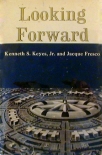Looking Forward by Kenneth Jr. (reading diary .txt) 📕

Read free book «Looking Forward by Kenneth Jr. (reading diary .txt) 📕» - read online or download for free at americanlibrarybooks.com
- Author: Kenneth Jr.
Read book online «Looking Forward by Kenneth Jr. (reading diary .txt) 📕». Author - Kenneth Jr.
How We Got Our Value System
Perhaps the most significant thing a person can know about himself is to understand his own system of values. Almost every thing we do is a reflection of our own personal value system. What do we mean by values? Our values are what we want out of life. No one is born with a set of values. Except for our basic physiological needs, such as air, water, and food, most of our values are acquired after birth.
As an example of how values are picked up, individuals who grow up in the twentieth-century America are conditioned to the acquisition of money as a part of their value structure. It isn’t “natural” for a person to want money. It’s a value most people in our culture acquire. When we were perhaps two years old, we learned that a penny would buy a piece of candy. We heard adults say with obvious approval, “He has a lot of money.” As we grew up, we observed the correlation between money and larger cars, more beautiful homes, finer clothes, etc. Feelings of self-worth became associated with money. Over the years we gradually acquired a value structure that led us to place such a high value on money that in our present economy of scarcity we spend a large part of our lives scratching for dollars.
If we had grown up in a society where people do not stress material wealth, money would not have played an important part in our value structure. In Samoa food is there for the taking. Coconuts and fruit grow without cultivation, fish are available in the nearby sea, little or no clothing is needed, and it doesn’t take long to put up a thatched-roof hut from materials that grow on all sides. In such a society people may be less likely to work hard for money. People conditioned in this manner do not act in ways men consider acquisitive, competitive, and thrifty.
When a culture is in a rapid state of transition, we have conflicting values which often yield hostility and unhappiness. Most people in twentieth-century America have a value system that includes both sincerity and the desire for money. Suppose a merchant advertising a sale were to include a “loss-leader” item such as a dacron shirt for $1.49. But if people flocked to purchase this advertised shirt, they would find that he had only six for sale at this price. The conflict in values might be felt by both the merchant and his customers. Our transitional culture of today keeps us in perpetual conflict.
Values are not immutable and eternal. They are created largely by the feelings of human beings. “The values both of individuals and of groups both large and small have been changed,” Ralph Borsodi advises us:
They are being changed today more rapidly than ever before. The acquisition and the inculcation of values begins at birth in the acceptance or rejection of the child by its parents; the values inculcated and acquired during the first few years of life affect the unconscious mind so deeply that their alteration is not easy, but they can be changed and it is easier to change them in the modern ... world than ever before.
Ralph Borsodi, “Eight Propositions About Values,” The Humanist, (1964, Number Five), p. 152. Copyright 1964 by the American Humanist Association, Humanist House, Yellow Springs, Ohio. Reprinted by permission.
We can test a value by asking, “Does it yield happiness for us?” There is nothing absolute about any value—it’s not a question of “right” or “wrong,” “true” or “false,” “good” or “bad.” We should ask ourselves, “How do our values affect our happiness, both present and future?”
The happenstance of when and where we are born determines what set of values we acquire. A few years or a few miles can make a whale of a difference. Although we know that no one is born with a set of values, the particular set of values we acquire seems both “inborn” and “natural” to us. We always feel strange when we meet people with a different set of values. They don’t act “right.”
Jacques Fresco, one of the authors, visited Bora-Bora in the Society Islands thirty years ago. He carried with him fifty pocket mirrors and hundreds of beads and other novelties that he hoped to use in place of money. Fresco showed these gifts to several natives and then put them into a suitcase. When he returned to his living quarters several hours later, he was surprised to see a number of men and women freely handing out the beads, mirrors, and other trinkets to their Polynesian friends. He interrupted them and asked what was going on. One of the older men replied that Fresco had more than he needed and that it was a shame to see so many wonderful things not being put to use.
After establishing a favorable relationship with the Polynesians, he made a casual comment that he would appreciate their help in building an outrigger canoe. They gathered in a huddle and left without saying anything. Several days later, they appeared carrying an outrigger canoe and presented him with this extravagant gift. During the next two weeks he was unable to find time to enjoy their gift. They appeared disturbed and picked up the canoe and carried it away.
“Why are you taking my canoe away?” he asked.
An older Polynesian stepped forth and commented resentfully, “We give you boat. You no use. We take back.”
It took Fresco a while to grasp fully





Comments (0)